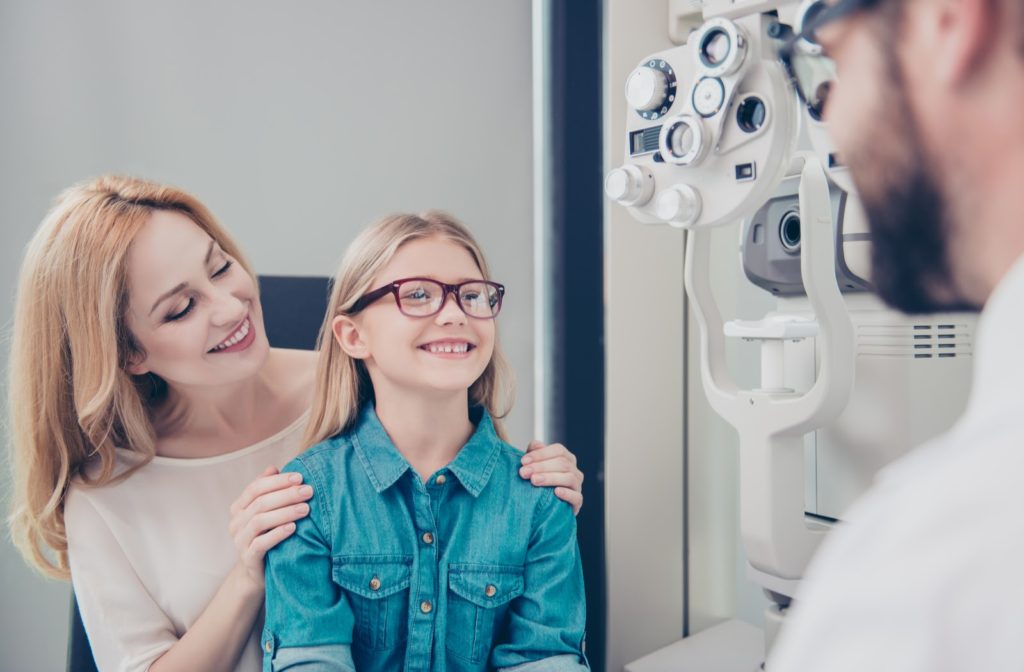There are many reasons why children may need to wear glasses. After an eye exam, your child’s eye doctor may recommend glasses to improve their vision, strengthen or protect their eyes, or improve the alignment of their eyes.
Whatever the reason, it is important that if your child needs glasses, they have eyewear that fits them properly.
How do I Know if My Child Needs Glasses?
Before you think about finding the right pair of glasses for your child, you need to know if your child requires glasses.
An eye examination done by your child’s eye doctor will determine whether your child needs glasses, and what prescription they require.
Common Signs & Symptoms
Your Child is Squinting
If your child needs to squint to see, it could mean that your child is suffering from a refractive error. A refractive error affects how the eyes focus on an image, and if there is an error, your child may be squinting to see objects and images more clearly.
Your Child is Holding Objects Close to Their Eyes
A common sign that your child is suffering from poor vision is if they need to hold objects close to their face to see them. If your child is doing this, it may be a sign that they are suffering from myopia (or nearsightedness) which means they can see close objects clearly but have trouble seeing objects at a distance.
Your Child is Tilting Their Head or Covering One Eye
In order to see properly, your child might tilt their head or cover one of their eyes. This could mean that your child is suffering from an eye misalignment such as amblyopia (or a “lazy eye”) which affects roughly 2% of all children, making it one of the most common eye conditions.
Your Child is Having Difficulty Concentrating on Tasks
Studies show that much of the learning your child does is visual. This means that if your child is having issues with their vision, it can appear as though they are having difficulties concentrating on tasks.
Your Child is Rubbing Their Eyes
If your child is rubbing their eyes excessively, it could indicate that your child is experiencing eye strain.
Your Child is complaining of Headaches or Eye Pain
If your child complains about eye pain or headaches regularly, it can be a sign that their eyes are being overexerted. This can also be a sign of digital eye strain.

How do I Know if My Child’s Glasses Fit?
After receiving an examination and understanding why your child needs glasses, the next step is finding glasses for your child with the correct fit.
Your child’s eye doctor will tell you the type of lenses your child requires but here are some additional things to look out for when choosing children’s eyewear:
Frames
When choosing frames for your child, you should pick frames that fit their face. You can tell that they fit your child’s face if the outer part of the frame comes to the end of their eyebrow, without extending past their cheeks.
Bridge
To stop your child’s glasses from falling, it is important to make sure that your child’s glasses fit at the bridge of their nose. There should be little to no space between their bridge and the glasses. Some glasses even have adjustable nose pads to ensure proper bridge fit.
Eye Position
When your child is trying on glasses, make sure that your child’s eyes are in the correct position. To tell if they’re in the right position, ensure that their eyes are completely centred in the middle of each lens.
Temples
The temples of your child’s glasses are the “arms” of the frames that connect the lenses to their head and keep their eyewear in place. The temples should rest on their ears, with the curve falling directly behind the ear. The temples should also extend in a completely straight line from ear to eye.
If the temples are not straight or too long to fit directly behind the ear when worn, your child’s glasses may fall down.
How do I take Care of My Child’s Glasses?
Glasses are a huge responsibility and can take some time for your child to get used to. Help your child take care of their glasses by making sure you follow these guidelines:
- When not being worn, glasses should always be placed in a case to avoid damage
- If their glasses need to be cleaned use a soft cotton cloth or a special “lens cloth”
- Don’t lay glasses lens down
- Handle glasses by the area between the lenses that cross the bridge of the nose
The Takeaway
Ensuring that your child has proper fitting glasses means that your child is more likely to wear them and allows for their vision issues to be corrected.
If you are having trouble finding the correct glasses for your child, your child’s eye doctor or an optician can help you find a pair of glasses that are the correct fit. Book an appointment today to discuss your child’s eyewear needs.




